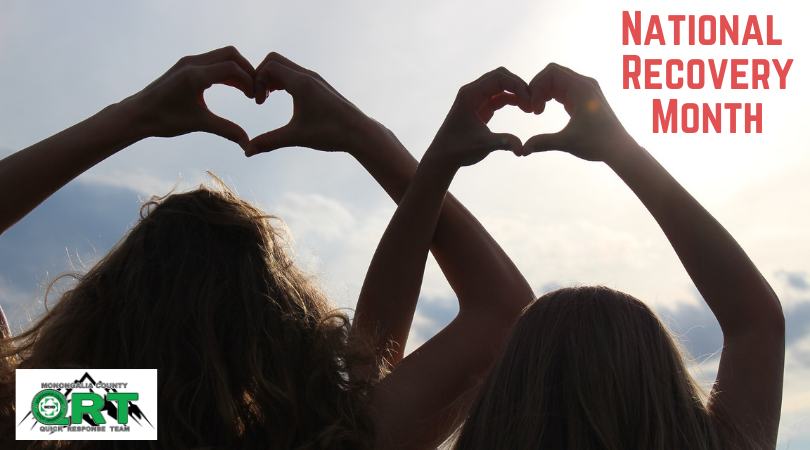National Recovery Month: Recover, Rehabilitate, Return to a Healthy Life

Sep. 29, 2020
By Matt Cimino
Many people know someone who has struggled, but the stories of overcoming hardship are not heard enough.
September is National Recovery Month, designated by the Substance Abuse and Mental Health Services Administration (SAMHSA). And it’s a great time to listen to how one individual first found — and then beat — addiction.
“My father was a struggling alcoholic when I was a kid, so I ended up moving in with my grandparents,” said Drew O’Connell, a West Virginia University student. “They were fantastic, just about as picture-perfect, white-picket-fence as you could imagine.”
“But I was introduced to drinking when I started high school.”
After a severe car accident in college, Drew was introduced to painkillers.
“Opioid addiction had me. I was a full-blown addict and didn’t know it. Pills went to needles and things got really bad.”
“I went from college student to homeless. I was able to shake opiates and find work that provided me housing, but I still struggled with alcohol.”
Although Drew overcame opioids for about three years, a severe swimming incident in Hawaii would hospitalize him and reintroduce painkillers to his life.
“After I came back, I decided enough was enough. I went into treatment, and at the same time had the opportunity to continue my schooling. It really helped me stay straight. I was in for six months, and then spent five months in outpatient care.”
Drew has decided to further his studies in West Virginia, and is now a part of West Virginia University’s Collegiate Recovery Program. He devotes his time to helping other students who are recovering. “I haven’t regretted a single thing since,” he said.
“The biggest thing I would say to others who are struggling is to find who you look up to. There are people who want to help and have been in the same position. People who have recovered know what you are going through, and they can guide you through it.”
Drew speaks to both high school and college students about recovery. He plans to continue the same work after graduating.
“Substance use disorder was something I didn’t even know I had until I recognized there was a problem to fix. To all those struggling, know that there’s a better way to live life.”
Stories like Drew’s remind us that recovery is possible. National Recovery Month is observed with a focus on informing people of substance use disorder and celebrating those in the recovery process. Reaching out for help can reopen the door to fulfilling, healthy lives.
It’s not easy and requires nothing short of hard work and complete dedication, but the Monongalia County Quick Response Team (QRT), established through a grant received by Monongalia County Health Department, shares that same initiative. The QRT is a collaboration among MCHD employees, peer recovery coaches, MECCA 911, law enforcement, EMS, local faith leaders and more.
The team continues to work around the clock to help individuals during a crisis, and to provide support for those in recovery. Calling 304-602-3305 will connect you to a member of WV PEERS, who also are members of the Monongalia County QRT. The peer recovery coaches at WV PEERS have lived experience with substance use disorder and can connect others to a variety of resources, from treatment to naloxone, which reverses the effects of an opioid overdose.
As part of the QRT, PRCs take overdose reports submitted by law enforcement, EMS and MECCA 911 and make all attempts to reach that individual within 24-72 hours to offer help.
The QRT is always looking for ways to provide more resources and help to others. Mark Liptrap, a counselor who specializes in helping those who have been exposed to substance use disorder, is one of the newest additions to the team as well as to Monongalia County Health Department, where he sees patients.
“Camaraderie and social interactions are very important,” Liptrap said. “One of the big struggles is not having that connection and helping each other through these hard times.”
He stresses that people are not alone in this process. The relationships you build are a vital step in recovery.
Medically assisted treatment (MAT) is another one of the possible steps to combat substance use disorder. This involves the prescription of a drug such as buprenorphine or methadone. In combination with recovery programs, this treatment can be helpful in stopping opioid use and retaining sobriety.
The theme for 2020’s NRM is “Join the Voices for Recovery: Celebrating Connections.” Successful treatment is not a solo journey. By sharing stories and building relationships with others who are or have been in a similar situation, the chances of a full recovery become more likely.
Returning to a healthy life is possible, and it’s rewarding to reach that goal.
To see if you or someone you know qualifies for counseling from Mark Liptrap, call 304-598-5160 or email him at Mark.A.Liptrap@wv.gov.
Matt Cimino is a public health office intern at Monongalia County Health Department.